The VIF held an internal discussion on the current trends in the Chinese economy on 21 July 2016. The discussion was held in two parts; part one of the discussion ‘Slowdown of the Chinese Economy: Implications for India’ was led by Dr. Arvind Virmani, former Economic Advisor, Ministry of Finance (India) and Executive Director, IMF (International Monetary Fund), while Amb Ashok K Kantha, India’s former Ambassador to China and Distinguished Fellow, VIF, analysed the ‘New Normal in China’s Economy: Implications for India’.
While comparing the two economies in specific sectors, Mr. Virmani stressed that India needs to draw lessons from where China went wrong. He underlined that economic recession which hit major economies of the world in 2008 was more of a global financial crisis that rebounds almost every  75-odd years. His hypothesis contradicts a popular perception which suggests that economies world over tend to dive into recession once every 10-15 years, the only difference being this time around its severity was more. China, like many others, misread the situation and did not run a budget deficit.
75-odd years. His hypothesis contradicts a popular perception which suggests that economies world over tend to dive into recession once every 10-15 years, the only difference being this time around its severity was more. China, like many others, misread the situation and did not run a budget deficit.
A budget deficit would have created demand and because of their inability to do so, demand that should have been created wasn’t there, which eventually led to a decline in Chinese exports. Second, unlike what many people tend to believe gap between the GDPs of the two countries is widening, Mr. Virmani sought to emphasize that growing convergence in the GDP trends seems to indicate India’s GDP will catch up with China’s in the next 35-40 years, backing up his arguments with relevant data and charts culled from plethora of sources. He also pooh-poohed the idea that China's exports are declining due to a burgeoning middle class, pointing out that the consumption share (usually a good indicator of the strength of middle class) is actually at a very low level. In his opinion, China rode the global export boost of the 1990s to exponentially increase its trade surplus but since then, the tendency to sacrifice long term economic stability for short term growth is making a bad situation worse.
Amb. Kantha, while bolstering a few of Dr. Virmani’s arguments, differed on a few others. According to him, the old drivers of growth have stopped yielding results, while the new drivers haven’t kicked in yet, although there has been significant focus on domestic markets of late. Dwelling more on the political economy of China, Amb Kantha stressed that part of the reason China has been flexing muscles in and around the region is because
 the ‘Chinese Dream’ isn’t selling anymore, a ploy to distract domestic attention away from a failing economy. Coupled with that, there are populists slogans like the doubling the income of every Chinese worker by 2021, a difficult proposition to meet if the economy doesn’t grow by 6.5 per cent or more every year to reach this self imposed target. The Ambassador questioned the wisdom of making such populist slogans in the backdrop of economic stability which is still some distance away. He asserted that during the 19th CPC President Xi Jinping will be leading the Chinese government to a crossroad and the CPC must choose one path or the other. They (the officials of the CPC) can either allow Xi to consolidate his power and become even more autocratic, or they can 'persuade' Xi to shed some of his powers.
the ‘Chinese Dream’ isn’t selling anymore, a ploy to distract domestic attention away from a failing economy. Coupled with that, there are populists slogans like the doubling the income of every Chinese worker by 2021, a difficult proposition to meet if the economy doesn’t grow by 6.5 per cent or more every year to reach this self imposed target. The Ambassador questioned the wisdom of making such populist slogans in the backdrop of economic stability which is still some distance away. He asserted that during the 19th CPC President Xi Jinping will be leading the Chinese government to a crossroad and the CPC must choose one path or the other. They (the officials of the CPC) can either allow Xi to consolidate his power and become even more autocratic, or they can 'persuade' Xi to shed some of his powers.
A lively interactive session followed the two presentations. Interestingly, the house was evenly divided as to what percentage of President Xi Jingping’s touted China’s OBOR (One Road One Belt), running through Pakistan up to Gwadar port on the Arabian Sea, is driven by geo-strategic or economic considerations. Amb Prabhat Shukla, Distinguished Fellow, VIF was prominent among those who made key inventions during the discussions. With General NC Vij, Director, VIF, in the Chair, discussions were modereated by Amb Ashok Kantha.








